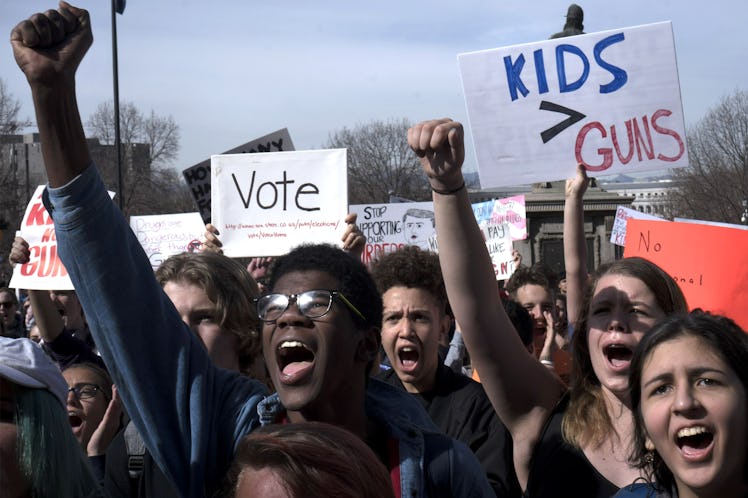
Could Gun Control Activists Beat The NRA By Copying Their Playbook?
On Saturday, March 24, an expected hundreds of thousands of students from across the country will march to make their voices heard on the issue of gun control. The students are reacting to a rash of school shootings and demanding that lawmakers hear their calls for increased gun control. Noble as their cause may be, these students are coming against the National Rifle Association (NRA), one of the most powerful organizations in American politics. Given that group's dominance, many are questioning if gun control activists can beat the NRA, even if there's a significant showing at the March For Our Lives on Saturday.
The march was created because of the outspoken students of Marjory Stoneman Douglas High School, who are themselves survivors of a Feb. 14 mass shooting that left 17 students and educators dead. Both their words and their effectiveness at being and staying heard are extraordinary, especially considering that calls for gun control are so often quieted shortly after the latest mass shooting. Still, at the end of the day, it's a bunch of teenagers going up against an extremely organized and well-funded group.
For some insight into the question of what can be done against the NRA, I spoke with Ben Brown, the founder and CEO of the Association of Young Americans (AYA), a group dedicated to making the voices and concerns of young Americans heard in politics.
Brown has been extremely impressed by the work and drive of the Parkland students and says, "from what I've seen, the Parkland students need no advice." (He'll be in attendance in D.C. on Saturday.) He is especially grateful that the students are not just calling for gun reform, but calling out the NRA and the politicians that are swayed by the organization.
"What they've really done, I think, is shed a light on an even larger issue, which is this idea that some organizations and lobbyists just have total ownership over certain conversations," Brown says. Rather than continue to call out this disparity, Brown wants to use the NRA's playbook against them by getting young people to have their own lobbying force.
"Money in politics is a problem. It elevates the concerns and voices of people and organizations that have resources and money, and diminishes the voices and concerns of those who don't," Brown says. "That being said, there are parts of lobbying that just aren't going to go away."
"Lobbying really just means telling your legislator what you want," Brown explains, and a lobbyist is someone who does that on someone else's behalf. Calling your rep, for instance, is technically lobbying. But over the last few decades, lobbying has evolved as corporations and wealthy individuals realized they could hire people to lobby full-time, building an industry out of it.
"The NRA, love 'em or hate 'em, they are extremely effective ... They lobby really, really hard and really strategically," Brown says. In 2017, the NRA had 26 lobbyists and spent upwards of $5 million on lobbying, according to the Center for Responsive Politics.
"That's a lot of money and that's a lot of people to work full-time on a specific issue, but it's not insane. There are 80 million young people between 18 and 35. At the Association for Young Americans, we think that if we can organize and unite young people — similarly to what the Parkland students are seeing — people are really unified on certain specifics in this issue and that there are enough people and voices to push back."
With this, Brown believes, young people can use the tools in place to push back against the NRA (and the other powerful lobbies that go against the beliefs of many members of younger generations). No, it's not overturning the system, but it is using it to your own advantage. And even without a lobbying group, there's still work that young, impassioned people can do.
"To everyone who is talking about any issue they care about, whether it's gun control or student debt or criminal justice reform: Keep going," Brown says. "Our legislators really do work for us. If you are eligible to vote, register to vote, and then go vote, and bring your friends. Don't forget that politics happen every day, not just during an election year."